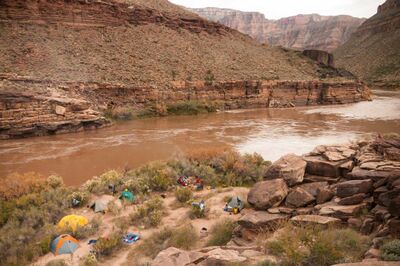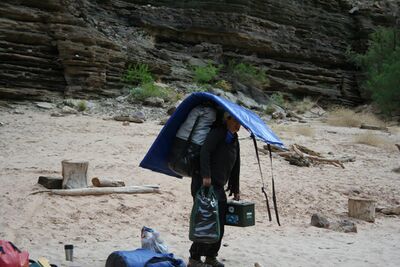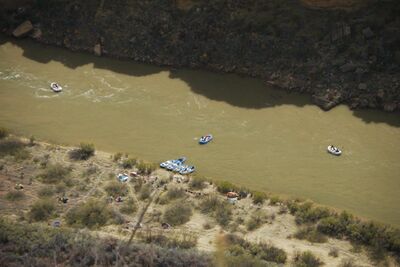At Camp: Difference between revisions
mNo edit summary |
mNo edit summary |
||
| (One intermediate revision by the same user not shown) | |||
| Line 28: | Line 28: | ||
[[Image: | [[Image:Camp layout 2.jpg|400px|right]] | ||
Latest revision as of 09:07, 30 December 2022
This chapter includes info on arrival time in camp, departure time from camp, kitchen location set up, Solid Waste Management, sanitation including hand washing, Fires, personal campsite set-up i.e., wind blowing gear away, waiting to set up personal camp until all boat unloading and kitchen set up is done, bathing, nudity, noise (boomboxes), and Hygiene and Personal Care.
When arriving at camp, the first item of business is making sure none of the rafts miss the camp and tying off the rafts. When tying off to trees or bushes try to minimize the amount of breaking off off branches and such.
The second item for most groups is to locate the kitchen. Usually the kitchen crew for that camp will make the choice. It should take into account minimization of lugging the kitchen gear and leaving room for tents or cots and aesthetics of the location.
Remember that finding a secluded spot for the bathroom is important too. You'll want the bathroom close to the river and not too far from camp. Also, the bathroom location has priority over where folks place their personal campsite.
The next order of business is evaluating the weather and deciding whether to set up a tarp. If it is raining you might want to stay dry. But tarps are also useful for shade from the hot sun if you have a camp without its own shade and it is not late in the day. The tarp should be located near the kitchen. If you are setting up the tarp for shade, once you have it set up you now have a tarp that could be 120 degrees in the summer and the sand below which has been baking in the sun all day and likely also is 120 degrees and combined you have a pretty good oven. You might look around and think where is something cool that might fix this. Ah, the river. Bailing buckets of cool river water poured on the sand under the tarp not only cools off the sand but the damp sand creates adiabatic cooling like the ubiquitous swamp coolers of the Desert Southwest. This can really help keep the cool of everyone in your group and avoid heat-related issues.
Click here to return to The Trip page.


